How The Bridge works
- Alexandre Pierrepont
- 2021
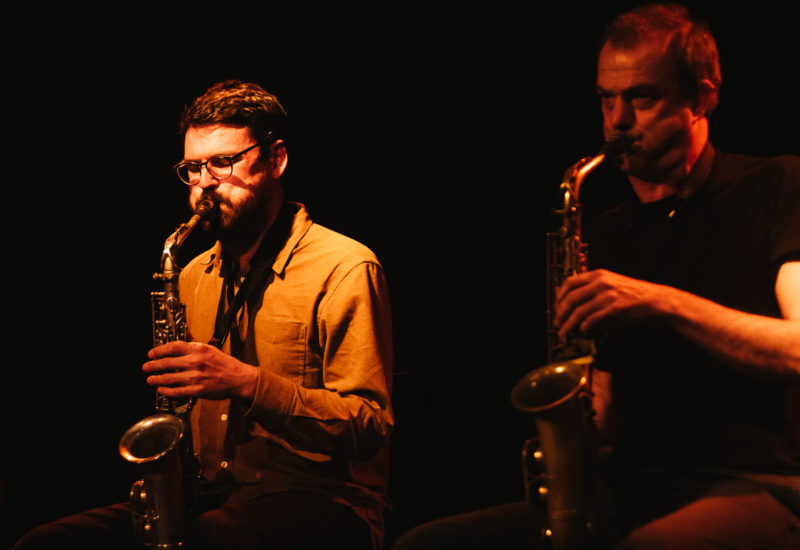
The Bridge has been building since 2013, inspired by a simple observation: if it is now common knowledge that jazz and improvised music, in France and in Europe, have found their flight, their specificity and their independence, certain North American scenes, particularly that of Chicago and the Midwest, continue to develop at their own pace. The autonomy acquired and the originality developed by some and others should not prevent new forms of cooperation. On the contrary, we believe that they should even encourage them.
Bringing together French and North American musicians on a long-term basis (our network brings together nearly 140 musicians from both countries, who are divided into quartets and quintets, themselves divided into two cycles); giving them the space, giving them the time, giving them the opportunity to get to know each other, in their similarities and differences, to develop their exchanges and their creative projects, in reciprocity and complementarity: this is the objective of The Bridge.
↓ ↓ ↓
Our plan is for each Franco-American ensemble to travel in turn to both continents on tours designed as exploratory journeys: ensembles that began in France then move on to the United States, and vice versa.
Each tour is conceived and produced as a series of concerts in all kinds of venues (from clubs to festivals, from conservatories to universities, from neighborhood associations to national museums, a minimum of fifteen concerts and events are guaranteed each time). But also as an opportunity for the travelling musicians to better understand the social, cultural and economic environment of their partners, thanks to multiple parallel events that are also and diversely addressed to all.
This is why The Bridge does not just promote one transatlantic ensemble or another, but uses each tour to electrify a network. It is about creating a real circulation of experiences, ideas and perspectives, almost ethnographic in nature. To take the long road of a mutual understanding that cannot spare the time to spend, to lose and to invent together, the economy of spaces and counter-spaces to repopulate. And through the bringing together of creative musicians, through the assembling of original music that feeds on these experiences, filtering them, transposing them and transforming them, it is also a question of solidarizing the structures and institutions that work daily and year-round with these musicians, and who are our obvious partners. With them, to propose another economic model for an intelligent diffusion of these musics; to make better dialogue between the music and the worlds.
The Bridge is not a place of diffusion anchored in a single physical space, a single territory, but a nebula associating such places everywhere in France and in Chicago. Our initiative would not have been possible without these alliances with clubs, festivals, music schools, conservatories, universities, cultural centers, media, on both sides of the Atlantic, nor without a “knowledge of the field” that immediately allowed us to identify, from the “base”, a first series of precious partners.
The educational aspect
Convinced of the values of cooperation, self-affirmation and self-transformation, as well as collective invention, of the sense of responsibility and freedom, and of inventiveness, which animate and deploy the music of the jazz field, The Bridge takes particular care – during and between tours – to transmit and share a know-how that is as much musical as it is social and cultural, as much an art of doing as it is a way of life.
In France, numerous actions are carried out during each tour, in priority in the animation centers, the primary and secondary schools of the cities and regions crossed, the conservatories and the universities also, thanks to a collaboration with the local partners, the academies and the Ministry of National Education, Higher Education and Research on a national scale. For The Bridge also works with several Conservatories with communal or regional influence (CRR), students of the CFMI or the Diploma of Musical Studies (D.E.M.) – where conferences and masterclasses are held. As well as with the music and humanities departments of several universities, including the University of Toulouse II – Jean Jaurès in Toulouse, the University of Bretagne Occidentale in Brest, the University of Paris 7 Denis Diderot and the University of Paris 8 Saint Denis, the Parisian Center of the University of Chicago.
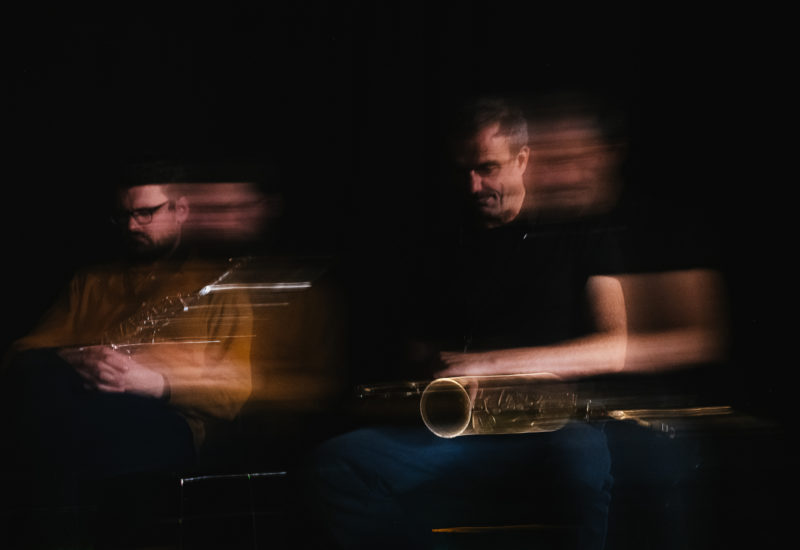
Let us point out that, since 2017, The Bridge has paid special attention to our loved ones, neighbors and commensals: refugees. In this case, it is always about mutual education, in the knowledge of oneself and the other. Each tour in France is an opportunity either to invite groups of refugees to concerts or to visit the centers that welcome them. Over the years, we have collaborated with the Emmaus Solidarity Center and with Artistes en Exil in Paris, with isolated minors from the Timmy Association in the Paris region, with the Utopia56 association in Tours, with the Centre d’Accueil des Demandeurs d’Asile in Pontivy…
In Chicago, nothing was possible in 2020... But we must mention the partnership agreements that The Bridge has concluded with the music departments of Roosevelt University and DePaul University, which allow us to organize, in normal times, master-classes, workshops and/or concert-meetings with the touring ensembles. The agreement with the University of Chicago is the most substantial. The Bridge organizes a major concert-meeting at the Reva and David Logan Center for the Arts each trip, and multiple visits, both before and after, to the classes of the associate professors. In 2019, new partnerships with the Old Town School of Folk Music in Chicago and Washinton University in St. Louis, Missouri were inaugurated, but had to be suspended in 2020...
As the tour progressed, workshops were also organized in community and school settings, at the South Shore Fine Arts Academy, at the South Side Community Arts Center, at Columbia College (through the Jazz Links Student Council program overseen by the Jazz Institute of Chicago), at Chicago State University or with the Rebuild Foundation. The Bridge also works alternately with several public and private schools in Chicago: Marie Curie High School, Whitney M. Young Magnet High School, Chicago High School for the Arts (ChiArts), Lycée Français de Chicago.
Since 2017, The Bridge has been linked to the After School Matters program, through which touring musicians conduct musical outreach at the Chicago West Community Music Center, and sometimes host the ASM-CWCMC Orchestra as an opening act for one of their concerts. During Quelque chose comme un festival in Paris, in October 2019, and thanks to the support of the University of Chicago, we were able to invite 16 students from this orchestra to France, who were able to interact with a class from the Sólveig Anspach middle school in Montreuil and a class from the Mozart high school in Blanc-Mesnil, as well as open the evening of concerts at La Dynamo de Banlieues Bleues with a performance. This collaboration was supposed to lead, in the opposite direction, to a trip of the French students to Chicago in 2020. Which also had to be postponed.
2020 & 2021, truncated years
It could all start with the ordinary exercise of self-congratulation: by organizing, since 2013, more than 100 concerts and events per year, thanks to 50 partner venues on both sides of the Atlantic, for the 140 members of its network, but also for dozens of musicians outside the network, while developing an elegant label and a broad educational component, The Bridge has positioned itself as the main structure currently working between France and the United States in the world of jazz and improvised music. The “test of facts” has allowed us to verify the validity of our network, as an artistic project and as an alternative model of production and distribution, structuring in more than one way and over the long term.
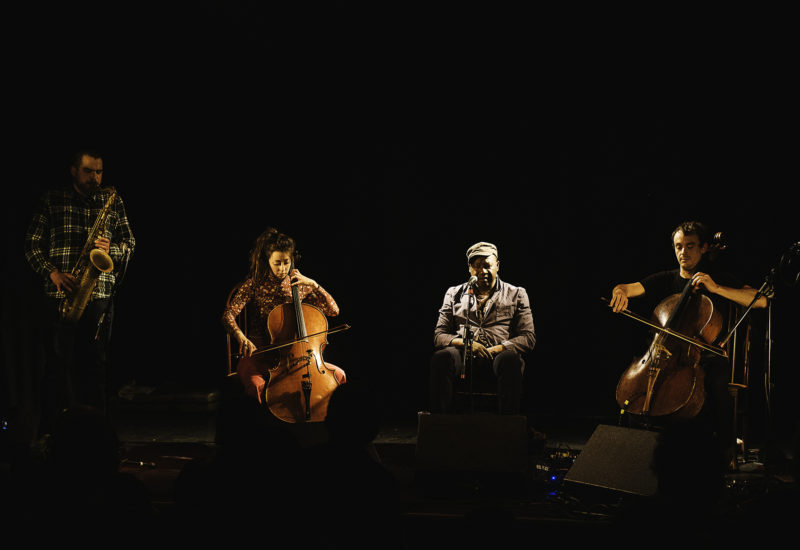
However, given the context and the pandemic, the two North American tours of 2020 had to be postponed to 2021 and 2022. These were the sets:
- April/May (Chicago): The Bridge #14 / Boars (return trip): Keefe Jackson, Didier Lasserre, Peter Orins, Dave Rempis & Christine Wodrascka.
- October/November (Chicago): The Bridge # 2.4: Morgane Carnet, Jozef Dumoulin, Fanny Lafargues, Damon Locks & Macie Stewart.
Only the tours in France could take place:
- February (France) : The Bridge # 2.3 : Gaspar Claus, Gerrit Hatcher, Erwan Keravec, Lia Kohl & Marvin Tate ;
- October (France) : The Bridge # 13 / Forget to Find (return trip) : Jean-Luc Guionnet, Pierre-Antoine Badaroux, Jim Baker & Jason Roebke.
Crisis management
Of the four annual tours that The Bridge normally organizes, we were only able to carry out the two French tours in 2020, those in the United States having to be postponed to 2021 and 2022 – the first, because it took place at the beginning of the year, before the confinement. The second one, in a truncated way but with an original device that allowed us to accommodate as much as possible the travel restrictions. In collaboration with the French musicians of the group, we commissioned two radio pieces from the American artists, recorded in the studio and on location by one of our historical partners in Chicago (and a major player in the recovery initiatives): the Experimental Sound Studio. These recordings were broadcast during the concerts in France, and served as material for exchange and interaction, albeit deferred, between French and American musicians. In the presence of Pierre-Antoine Badaroux and Jean-Luc Guionnet, and in the absence or distance of Jim Baker and Jason Roebke (or in their shadows and waves carried from Chicago). This device allowed us to maintain a form of collective and transcultural creation dear to The Bridge, but also to pay the American artists whose working and living conditions are directly and seriously impacted by this global crisis.
+ Other initiatives have been taken since the spring and the first lockdown to imagine responsible and creative ways to maintain the activity of musicians and technicians on both sides of the Atlantic, while waiting for the resumption of international exchanges (see https://www.periscope-lyon.com/article/the-bridge-sadapte-et-tente-de-trouver-des-reponses-malgre-les-crises-actuelles/).
To “compensate“, to maintain the tension and to bend the arc of the future, The Bridge has organized, with several of its partners, a series of parallel events.
- The September 13, 2020, streaming of two concerts by members of the Antichamber Music quartet, two duets each at home, as part of Experimental Sound Studio’s Quarantine Concert Series, followed by the screening of Sandra Binion’s documentary The Physicality of Thinking, which followed the group on their January/February 2019 French tour. The film documents the tour of Claudia Solal (vocals), Benoît Delbecq (piano and prepared piano), Katherine Young (bassoon and electronics) and Lou Mallozzi (turntables and CD). It takes the viewer backstage and into the corridors – on the road, on country roads, at lunch or dinner, in back rooms, during meetings and workshops with students – while capturing the many moods and dynamics of the quartet as they perform.
- The streaming of two evening concerts, mirroring each other, one from Chicago and the Constellation Hall on November 27, 2020 (finally moved to December 4 due to lockdown), entitled “Separatist Party”, with 6 North American musicians from the network (Marvin Tate, Ben Lamar Gay, Fred Jackson, Nolan Chin, Jakob Heineman & Mike Reed); the other from Pantin and the La Dynamo Hall on November 28, entitled “Les amis américains”, with 6 French musicians from the network: three duos constituting the French part of different groups of The Bridge (Joëlle Léandre and Bernard Santacruz; Benoît Delbecq and Claudia Solal; Mathieu Sourisseau and Mike Ladd). Three pairs of kings and queens of free improvisation, three absolutely peaceful duets, between six residents of the Republic and six citizens of the world, as if to underline an absence: that of the American friends. This concert was captured live by the CultureBox teams, who are also preparing a documentary film on the operation.
- The streaming on December 6, 2020, as part of the Quarantine Concert Series of the Experimental Sound Studio, of a solo by Fanny Lasfargues from Marseille, followed by a duet between Macie Stewart and Damon Locks from Chicago, all members of the quintet The Bridge #2.4, which was to make its creation tour in Chicago and the Midwest in October-November.
- The streaming on April 24, 2021, as part of the Quarantine Concert Series of the Experimental Sound Studio, of a duo between Keefe Jackson and Dave Rempis from Chicago, followed by a quartet with Sakina Abdou, Jean-Luc Guionnet, Peter Orins & Christian Pruvost from Lille, most of them members of the quintet The Bridge #14, which was to make its tour in Chicago and the Midwest in the Spring.
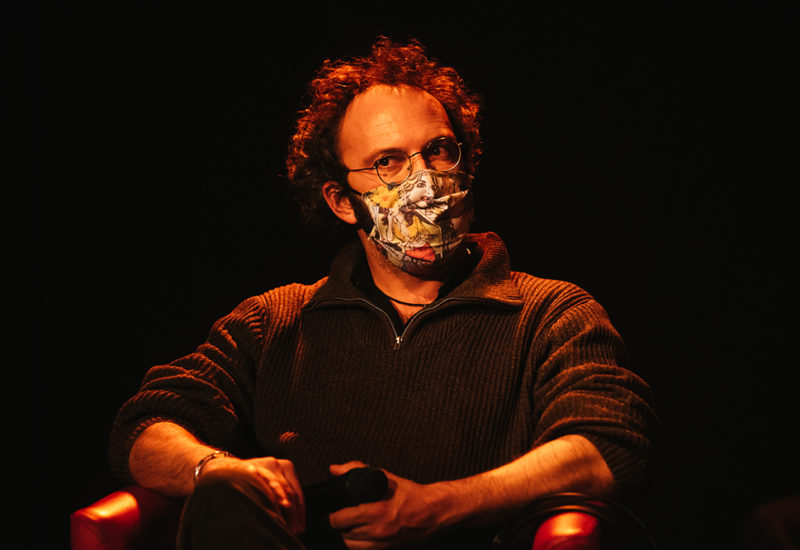
The example of a tour realized in a period of confinement: The Bridge #15 (JayVe Montgomery, Didier Petit & Edward Perraud), in January and February 2021, in France.
These “remote” events were not planned and cannot be an end in themselves. But as long as we are physically far from each other, off the land, the countries and the music of Cocagne, it seems necessary to us to maintain contact, between musicians, partners, and audiences, without really pretending to fill this distance. Because if we cannot counterfeit the lived presence of things and beings, it remains possible to send signals. To use the way of the waves. To make appear forms and to make hear songs. To greet the spirit of continuity that animates us all, and to signal to the absent ones who are present on the other side of the world. In the pickaxe of a world to be reinvented.
In a world of adventures and misadventures, the tour of The Bridge was able to take place in France in January and February 2021, in the presence of a North American musician invited in his capacity as associate researcher at the ArTec laboratory of the University of Paris 8 – Saint-Denis. To have place: to make again, with each of our partners, that the places of diffusion exist under a form or under another, authorized by the situation. In the most prudent and reasonable conditions that the circumstances require.
- On Tuesday April 27, 201, we organized with the University of Chicago Center in Paris a Zoom Webinar: “Circulation, Improvisation and Attention: Creative Music in the Time of Pandemic”. This virtual panel discussion brought together scholars and musicians from both sides of the Atlantic who explored and discussed the notions of circulation, improvisation and attention in the context of today’s Covid pandemic and its impact on the field of creative music. With Yves Citton (professor of Literature and Media at the Université Paris 8 Vincennes-Saint Denis and executive director of the Ecole Universitaire de Recheche ArTeC), Travis Jackson (Associate Professor in the Department of Music and the Humanities at the University of Chicago), Joëlle Léandre (double bassist, vocalist, and composer), Nicole Mitchell (flautist and composer, and the William S. Dietrich II Endowed Chair in Jazz at the University of Pittsburgh), George E. Lewis (trombone player, composer and the Edwin H. Case Professor of American Music at Columbia University, where he serves as Area Chair in Composition and Faculty in Historical Musicology), Yannick Séité (professor of Literature at the Université de Tours).
Activities of the group on tour
- 8 “concerts” in Poitiers, Dijon, Lyon, Brest, Paris / Pantin, Albi, Toulouse & Tours.
- Poitiers : at the Confort Moderne, thanks to Jazz à Poitiers, the concert was transformed into a creative residency and a recording session behind closed doors.
- Dijon : at the Consortium, thanks to Zutique Production, the concert was transformed into a filmed performance for a documentary to come, in front of a reduced audience.
- Lyon : at the Périscope, the concert was transformed into a radio broadcast and a streamed performance, in front of a reduced audience.
- Brest : at the Chapelle Dérézo, thanks to Plages Magnétiques and the Compagnie Dérézo, the concert was transformed into a performance shared with the company’s actors, for a professional audience.
- Paris / Pantin : at La Dynamo de Banlieues Bleues, the concert was transformed into a performance for an audience of professionals.
- Albi : at the Frigo, the concert was transformed into a radio broadcast for Radio Albigès, in front of a reduced audience.
- Toulouse : in the studios of Radio Campus Toulouse, thanks to Un Pavé dans le Jazz, the concert was transformed into a radio broadcast for Radio Campus Toulouse, in front of a reduced audience.
- Tours : at the Petit Faucheux, the concert was transformed into a radio broadcast for Radio Campus Tours, in front of a reduced audience.
Parallel activities of the group members
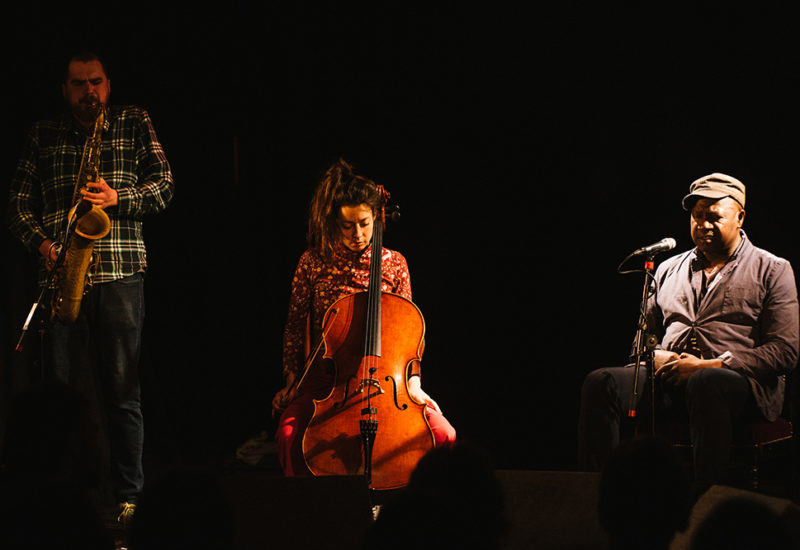
- Performance by JayVe Montgomery & Didier Petit with Etienne Cabaret & Christophe Rocher at the Trémargat educational farm.
- Recording session of JayVe Montgomery & Edward Perraud in Saint-Pierre-des-Corps.
- Concert-meeting of JayVe Montgomery, Didier Petit & Edward Perraud with the students of the Agricultural Engineering School of Purpan – Toulouse.
- Concert-meeting of JayVe Montgomery, Didier Petit & Edward Perraud with the participants of the civic services, Cultures du Cœur 37, Temps Machine and Volapük in Tours.
- Concert-meeting of JayVe Montgomery with the students of Camille Vallaux College in Le Relecq-Kerhuon.
- Masterclass of JayVe Montgomery, Didier Petit & Edward Perraud La Dynamo de Pantin with the students of the Music department of the University Paris 8 – Saint-Denis.
- Masterclass of JayVe Montgomery at the Music Department of the University Paris 8 – Saint-Denis.
- Masterclass of JayVe Montgomery & Didier Petit with the first year students of the CFMI (DUMI) in Poitiers. – Round table on the current situation of JayVe Montgomery & Didier Petit with Fabien Simon, Jean Rochard, Raphaëlle Tchamitchian, Pierre Tenne & Yaping Wang, at the Théâtre d’Ivry, as part of the Sons d’hiver festival.
Prospects for The Bridge in 2021-2022, and Beyond
For now, and this is only part of the answer, it seems to us that acting or planning to act is still the best thing we can do while we wait for what happens next. Acting means first of all maintaining the framework of our activities, while remaining ready to adapt. The original system of recordings made at home but “at a distance” by the musicians who are not yet able to travel, and then used by their “face-to-face” partners, will for example be reused if necessary. In the “worst” case, if it is a question of pure and simple prohibition of any public event, we envisage transforming the period of the tour into a period of “writing residency”, or more exactly, as far as improvisers are concerned, of “conception residency(s)” for the artists at home: musicians would be commissioned by The Bridge to put together a repertoire or a program, working on it together but at a distance. A few public streaming performances could intersperse this residency.
If we can reasonably estimate that the year 2022 will still be transitory, it is not a question in the meantime of maintaining activities for the sake of maintaining activities, but rather of continuing to structure a sector and to develop a project. We are not blindly persevering. We know that we are living in uncertain times that raise many questions that we do not want to ignore.
- If music famously has the power to put us in all states, in what state does it put us when the band of accessible emotional frequencies is increasingly narrow? Does it pretend to believe in the exceptional character of this “strange peace”, to mock its gloom, to continue as soon as possible its works and its usual maneuvers? Can she be content to wait or hope that business will pick up again?
- If music, what happens in music, has the power to give us a power to act, how does it still give us power when everything, around it and sometimes also in it, reduces us to a quasi-impotence? Does it confront this impotence which is also its own, to transform it?
↓ ↓ ↓
In one way or another, we will have to “adapt” (“reinvent ourselves”, it has been said sometimes, to show a “capacity of projection”…). This way can resemble us, be inspired by the solidary and creative logics in the heart of the musics which we defend and which carry in them, if we want to listen to them, to question them, elements of answer. For upsetting uses of the music, which would upset the value of exchange in particular. The main virtue of the trying moment we are going through would be perhaps to incite those who have not already done so to think about repositioning their practices and their projects in the world, such as it is going, such as it is not going.
- The Bridge‘s goal is to help form groups, motley crews, Franco-American fraternities/sororities sharing a sensitive, artistic, socio-cultural experience. This is why we will not abandon our international specificity and what it implies: international exchanges developed through tours or exploratory trips, in both directions, favoring the inter-knowledge between musicians and structures from both continents. That is to say, to have musicians play together, to have them meet each other and to have others discover them. To make dialogue not only between people, but between places and scenes, and through their representatives, between societies.
- From the start, the conditions under which The Bridge conceives these continental and intercontinental trips are eco-responsible, with the idea of changing the very model of what a tour represents, into a form of semi-nomadism. A single intercontinental flight is made for a trip that resembles a real stay abroad: multiple concerts, multiple events, multiple activities, on a given territory, by reciprocal impregnation between the visited and the visitors, to whom we offer all the reasons to be there, together, in the presence of each other.
In presence, or “presential” therefore: jazz and improvisation music are, perhaps more than any other, music of the moment – as has been said and repeated – but also music of place: of the full lived presence of things and beings, which is always a co-presence, in situation. Musicians and audiences. These are musics of the shared and resonant space, eminently social musics which are invented by several people, in a work of collective intelligence on the spot and in real time, as well as over time. The “distant” cannot communicate all the sensations, all the perceptions, all the emotions of full presence. Nor can it hide the fact that a physical distance is more or less filled, that this distance cannot hide the fact that an absence is indeed felt, and that it also has its interest as an absence. The “distance” and how it is arranged will therefore remain secondary for us, literally. In 2021, therefore, and as long as it is necessary, The Bridge will continue to use the means offered to us by new technologies to draw links.
It will always be in support.
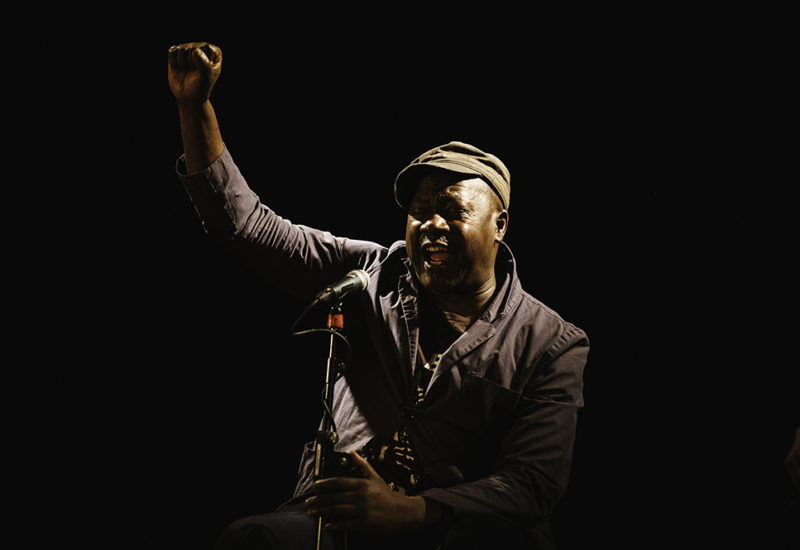
The Bridge and its partners offer the best working conditions to the associated musicians: tours set up in their image and at their rhythm without the need to negotiate and bargain for “dates”; a time-space for collective creation without any external constraints, but in intense interaction with the surrounding world, with no other stake than the human and artistic, where each and every one of them can be a full-time musician. In order to further increase the great principle that animates us, we have begun to imagine residencies at the homes of one or another of our privileged partners, in alternation, during each tour.
In order to amplify the contacts and collaborations with the local scenes, which are sometimes those of a member of the orchestra in circulation; in order to deepen our cultural actions towards all types of public; in order to better serve and serve a territory. In France, we are currently exploring these avenues with our partners at Plages Magnétiques in Brest, Confort Moderne in Poitiers, Petit Faucheux in Tours, Zutique in Dijon and Périscope in Lyon. In the Midwest, where we have consolidated our network of partners around Chicago for short stays of a few days, in Milwaukee and Madison, or in Saint Louis, the equivalent is already in place at the University of Chicago, at the Experimental Sound Studio, at Constellation.